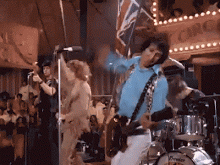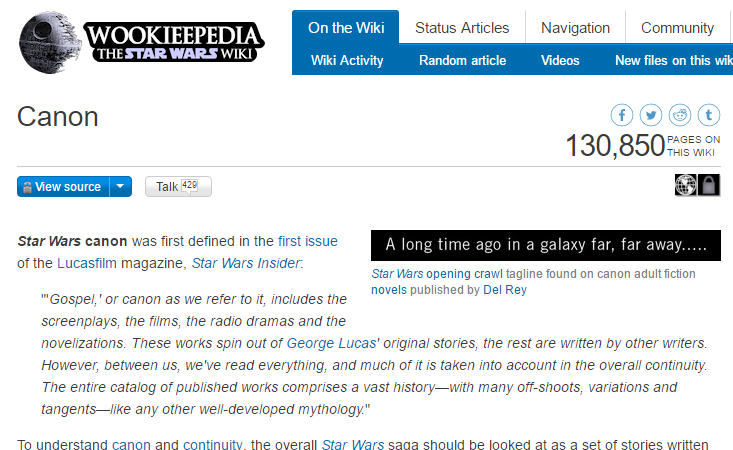Tracklist
01. Richard Rodgers – South Pacific Overture
02. Rush – Tom Sawyer
03. Booker T. and the M.G.’s – Green Onions
04. Louis Armstrong – Hello, Dolly!
05. Ozma – Korobeiniki
06. Ramones – Blitzkrieg Bop
07. King Crimson – The Court of the Crimson King
08. Peccatum – Murder
09. Weezer – Island in the Sun
10. Canadian Brass – Canon in D
11. Jethro Tull – Black Sunday
12. Iron Maiden – Run to the Hills
13. Nobuo Uematsu – Fight On!
14. Band of the Grenadier Guards – Liberty Bell March
15. Bill Withers – Lean on Me
16. Howard Shore – The Riders of Rohan
17. Louis Armstrong – What a Wonderful World
01. Richard Rodgers – South Pacific Overture (South Pacific, 1949)
Mr. Harris assumed I knew anything at all about operating an audio mixing board for a live theater performance. (I suppose this was half true thanks to my time in the TV studio, but I’d hardly count “turn the knob clockwise to raise the volume” as knowledge.) Based on this assumption, he asked me to take his place as the sound guy for the school play that year. I told him something to the effect of “I don’t know what that is or involves or what you’re talking about at all and probably haven’t done it before and also I can’t read or write,” but he grinned and said not to worry.
Next thing I knew I was spending every night after school backstage by a little closet at stage right containing eight mounted wireless lavalier microphones and a not-too-shabby mixing board. When you’re a nerd and someone just lets you play with the toys, well…“no” simply doesn’t exist.
The school play that year was Rodgers & Hammerstein’s South Pacific, which I’d never heard of. I’m not opposed to musical theater, but I’m not a fan by any stretch of the imagination. My feelings about the medium were largely irrelevant, of course, having been all but conscripted for the job, and it wasn’t a terribly hard job. I checked the batteries in the mics, watched the levels, and made faces feigning deep concentration on the knobs when feedback inevitably occurred. The result was a surprising amount of respect from the cast and crew: an odd cross-section of the musically and theatrically inclined (nerds) and Those Less Likely, students without a natural inclination to the stage who were talked into the gig by their nerd friends to fill needed roles. The rehearsals ran until well after dark, and the result was something of a circus.
I was a little pissed to discover that a small section of my own school band, my people, was enlisted to provide the music. I was one of two tuba players, and my elder tubist Justin was picked for the South Pacific band. Which was only fair: the arrangement only called for one tuba (as it so often does), and he was the better player, but what the hell, bro? I’m sitting here staring at bouncing LEDs while you get to honk away with “Honey Bun”? What a ripoff!
02. Rush – Tom Sawyer (Moving Pictures, 1981)
As a person with a passable (if not pleasant) voice, my attempts to sing unaccompanied (in my closet, in the dark, with the doors locked and the wifi off) have been met with full-on lizard brain conniptions. At the moment my voice pierces the void, all the guts in my body tell me to die.
So I have to admire Geddy Lee’s gumption. How did he build a career as a frontman with the voice of the Squirrel King?
The answer: sheer necessity. As a bassist, Geddy’s chances of recognition in even a three-piece band start somewhere beneath the x-axis. This is a problem inherent to the instrument, touched upon earlier in our discussions. The bassist is the “loser” of the band, and while there are several issues contributing to this stereotype, the most common is mobility.

Even the most skillful and complex of bass performances generally ask little more of the body than a couple of strong fingers and a capable fret arm. Sure, you can play with a pick, but even when you’re hitting a note as hard as you possibly can, you’re probably only hitting one note, not a chord. In the interest of accuracy and/or clarity, you’re probably not going to lift your arm to the sky just to slam the pick to one single string. If you aren’t picking it, then the idea of raising your arm and dramatically bringing it down just to engage the force of your index finger (hinged on a completely different fulcrum and moving in contrary motion to your arm) is positively ridiculous. The best a traditional bassman can do to show off visually is join a funk band and get to slappin’. Or be Les Claypool, immediately disqualifying you from tradition.

Guitars don’t have this problem. Drums don’t have this problem. Keyboards sort of do, but they’ve been rebelling since the days of Jerry Lee Lewis. Singers don’t have this problem, even when they’re without an instrument. Singers can dance, singers can strut, point at the audience, wander off during the guitar solo and try to climb inside the backdrop of the stage on SNL before realizing they need to get their ass back to the floor before the bridge comes around. (Looking at you, Mike Patton.)
Singers carrying instruments get the best of both worlds; freedom of movement and certified attention. No matter what they sound like or how flashy their movements may or may not be.
I’m not saying that’s necessarily why Geddy Lee ended up as the frontman and the bassist. I’m saying…
What was I saying? Something about squirrels?
03. Booker T and the M.G.’s – Green Onions (Green Onions, 1962)
I didn’t know it then, but the M.G.’s are as literal a foreshadowing of Blues Brothers to come as it gets.
Although I ought to have known about Booker T. and the M.G.’s before the Blues Brothers, I did not. Not outside of “Green Onions”. But the Blues boys were smart about the company they kept. That is the source of their credibility. Also? Every copy of Blues Brothers 2000 that you uncover and destroy. That helps.
04. Louis Armstrong – Hello, Dolly! (1964)
Gods bless this man. Louie got me out of a jam in the 8th grade when I was forced to take a nefarious class called Louisiana History.
No, I wasn’t particularly interested in the subject matter, and the class was taught by a coach (as many classes were), a notorious curmudgeon. He was one of those guys whose tests seldom reflected the material discussed in class (if you could even call what happened in that room a discussion as opposed to verbal waterboarding), and even after the warning shot of the first test, I found myself perpetually unprepared for each successive ambush.
I was surviving with solid C’s, but even I had my (parents’) standards (to be concerned about). I needed a B to stay out of the doghouse, which in this class called for a miracle. My prayers were answered in the assignment of a Project, an opportunity to work outside the boundaries of standard study-and-test procedure. The assignment was to create and give a visual presentation to the class based on a famous figure from Louisiana history. In the Year 2000, the gold standard for such a task was still the venerable trifold board, but the commoners of my class and our ruthless slaver didn’t know I was packing a secret weapon as soon as I heard the word “presentation.”

My weapon was the orange standard: Microsoft PowerPoint 2000. My friends and I had spent every morning and recess break of the 7th grade in the computer lab making mentally bankrupt and violent games and animations in PowerPoint, in the process becoming fluent in its use. We were unknowingly preparing ourselves for darker days to come.
When the 8th grade gave me lemons, I made PowerPoint presentations. They were easier and more fun to make than any traditional medium, and they were especially easy to assemble on short notice, the only timetable on which I operated in those days.
My ally in this endeavor was the late Louis Armstrong, arguably New Orleans’s favorite son, who at 62 years young ended the Beatles’ 14 week rule atop the Billboard charts with “Hello, Dolly!”, a cover from a recent musical that Louie had completely forgotten he recorded by the time it blew up. Louie remains the oldest artist to sit at #1, and, more importantly, he was a shoo-in as the subject of my presentation.
On the big day, I was mildly concerned when my computer lab cohort and classmate had also made a PowerPoint, and he even got to present before me. The poor rube hadn’t quite caught up with the times, though, and backed his file up to a floppy disk to bring to school. Between getting out of his desk and walking to the computer at the front of the room, he dropped the disk, rendering it (and his presentation) dead for the day. The force of his disgrace was so tremendous that his nose bled suddenly like the elevator in The Shining, and he had to be taken away by an ambulance. It was a tough act to follow, but with my compact disc in hand, I loaded up my show and got to work.
It probably wasn’t even that good! It’s too far back to remember, and the file is long gone, but my guess? Random pics of Louie aside a hastily rewritten summarized biography divided across maybe ten slides. Apply a premade design template that makes it look like you spent all night doing the background, set your text to fly in line by line (go easy on the sound effects), and you, sir, have just successfully masked your academic ineptitude with the finest of smoke and mirrors.
I didn’t even stand up in front of the class. I sat behind the computer and read off the slides verbatim while the class watched the fucking glory magic goodness on the connected TV on top of the computer cart. The cherry on top was the last slide, which played “Hello, Dolly!” over “The End.” Who else had a 24 carat Billboard #1 pop standard at the end of their show?
NOBODY. The only potential competition was currently erupting from both nose holes like a tiny double Vesuvius. Fucking slam dunk. My first A+ in the class, and a sign of undeserved success to come. Thanks, Pops.
05. Ozma – Korobeiniki (The Double Donkey Disc, 2002)
Or as you most likely know it, “Tetris Music A” or “a ray of the red dawn.”
I’m anything but qualified to comment on matters of diplomacy, but I have logged countless hours on Tetris for Game Boy, an iconic pair in gaming history. (I must admit up front, though, that I’ve always preferred Music B.)
I always thought that all three of the Game Boy Tetris songs were Russian ditties of some kind, but it turns out that only Music A has that distinction, being based on a Russian folk song about getting laid through commerce. Something like that.
As video game rock covers have made themselves more than comfortable as a genre since 2002, one must consider the challenges of adapting an instrumental, repetitive song into a popular music format. It’s not outright forbidden, but even the patience of the ravenous gaming fandoms is tested to sit through an entire set of it. They could be listening to this song while they play the game, why sit and watch you do it?
Your sacred talents of arrangement, of course! I don’t know if I’d call Ozma’s work sacred, but they do truly make a complete piece from the repurposed Russian classic without betraying the source. Driving bass with a few quick riffs make a short but perfect intro. They fly through the main theme a couple times, change up into a drum-light version of the theme, work in a four-bar outro and boom, has it been two and a half minutes already?
The only beef I have is due to the fatigue of the overdriven heavy metal sound that’s just so common in video game bands. Why can’t I have the myriad voices and clever stylings of a remix with the authenticity of a live band? WHAT DO YOU MEAN I DON’T GET EVERYTHING I WANT?
06. Ramones – Blitzkrieg Bop (Ramones, 1976)
If chord progressions could be copyrighted, the I-IV-V chord progression would be the crude oil in your backyard, but there are limits, even in the godforsaken realm of intellectual property.
I-IV-V was in the tonal consciousness long before the Ramones, but this is always the first song that jumps to mind when I think of it. It’s a basic progression used for basic songs, and nobody does basic like the Ramones. That’s what makes them so great. Ramones songs are all attitude, it’s all soul. The music is just architecture.
07. King Crimson – The Court of the Crimson King (In the Court of the Crimson King, 1969)
For all my talk of Tull, I was soon afterward equally enamored with a little group called King Crimson. The foray was at Brother’s behest, but if you’ve heard this album, you may understand it didn’t take much pressure. It sears. It soothes. It proclaims. It truly is a magnificent record, even if you don’t skip “Moonchild”. My uncle is a beer-drinkin’, truck-drivin’, Johnny Cash kind of guy, not anyone’s first guess for a King Crimson fan, but one day he was hanging around when my brother put on this album. Ever since then he’s always bugging us to play the song with the ahhhhhhhh, ahhhh-ahhh-ah so he can sing along. This one goes out to you, big dog.
In the Court of the Crimson King already lives in the annals of rock history as a Great Album, but it should also be remembered as one of the most impactful first impressions ever made in the art form. But you don’t have to take my word for it:
08. Peccatum – Murder (Amor Fati, 2001)
I knew there were wild cards in Brick’s deck, but what the hell happened here?
I must be able to blame this one on my brother’s folder. Dane stumbles on candy J-pop and takes home a piece on a whim? Unusual, but totally plausible. Dane stumbles on screeching black metal from its native land of Norway? And takes home a piece? Unthinkable, but props to me, I guess, for pushing my boundaries!
Props, also, to getting dumped for the first time, because I can’t imagine my taste for darkness being so…inviting without a little help from the fairer sex. Even still…are you hearing this? The sawing strings, the banshee wailing of the verse, the operatic chorus, the…girly…teasing in the transition? What’s that lyric in the bridge… “scream dragons giving birth”?? A moment, please, while I google that.
“Strait-jackets given birth”. I’m not sure I feel any better.
There are moments in the song which I can identify as the ones that must have resonated with me well enough to keep. The chorus with its soaring strings could fit right in Symphony of the Night. The production is very clean (almost too clean, approaching the sanitized fakeness of, say, a video game). The arrangement is interesting enough; none of the parts are unison or step on each other’s toes. The hooks are easy. For black metal this is pretty digestible.
Still, though, it’s just a bit on the nose for me to enjoy today. I can remember with embarrassing clarity the sadness I felt following the First Breakup, but I cannot remember ever really needing this song.
09. Weezer – Island in the Sun (Weezer, 2001)
It was Confirmation Class Girl that got me listening to Weezer again. I seemed to miss the signals when she told me that the songs she was sharing with me were all the songs that reminded her of her ex-boyfriend.
Joke’s on her, though! I stopped talking to her once I started dating the First, and three weeks later I came back to this song to nurse the wounds she gave me instead of Confirmation Class Girl. Now I’d like to just listen to Weezer without thinking about the 10th grade or girls at all. Guess I could just fire up one of the eight Weezer albums I haven’t heard. I’ll do it tomorrow.
10. Canadian Brass – Canon in D (Best of the Candian Brass, 1989)
Canadian Brass…on VEVO??
I know they’re huge in the the brass community, but VEVO is simply not where I expect to find chamber music.
I might have expected it in Brick’s hallowed halls, however, and certainly sooner than Volume 11. I’ve been playing tuba for 18 years, the earliest of which found me competing in the annual solo & ensemble festivals. These were always great excuses to duck off to the practice rooms with friends, cut up, maybe even play something. Music is one of my favorite means of socializing, and chamber pieces offer an intimate venue with which to act a fool with your closest fellow bards. I’m sure the Canadian Brass have a wealth of stories their esteemed reputation prevents them from ever sharing. Alas, the burdens of fame…
In college I was usually the lone tuba major/minor and so was enlisted into various quartets, sextets, whatever the hell-tets my instructors could scrounge up. I even got tapped to play a few wedding gigs. Nothing like sitting in for a few good blorts at a stranger’s wedding, being invited to the reception, then given a check for $120. Better days, for sure.
And lo, where there is a wedding, there be Pachelbel, his Canon at the ready.



Pachelbel is the original “Freebird”, the creator of the Immortal Progression. But you don’t have to take my word for it:
For as much as this guy and yours truly have complained about being stuck with a repetitive line, I remember getting a sort of zen pleasure from playing the concert band arrangement of this. By the way, I’ve only actually played the famous Canon in D in B-flat, because there’s a conspiracy among American school programs to keep wind players in perpetual fear of nearly three quarters of the circle of fifths. The Illuminati’s most heinous deed to date.
11. Jethro Tull – Black Sunday (A, 1980)
Now here’s the Bad Times I expected. Who better to usher the sadness than a charter member of the Brick Brigade?
“Black Sunday” chose itself as the anthem of my woe in the first weekend after my hasty refund to the Valley of the Single. I identified with the subject’s despondence and instant awareness of the nameless dread surrounding him.
Until the flute riff kicks in, though, you might not have even guessed this was a sad song. The guitar/bass unison intro strongly resembles the Super Mario Galaxy overture, a considerably less unhappy game. It’s fitting, though: “Black Sunday” is a big day and a bad day. Nobody likes it when bad things go down in a big way, and my First Breakup was, at the time, the Biggest and Baddest to go down. Don’t worry, guys, it got better.
A marks the beginning of techno-Tull, when Ian Anderson, like so many of his contemporaries, gave in fully to the allure of the musical machinations in rapid development. For those without a blind spot to such noise, it may come off sorely dated and downright cheesy, and though Jethro Tull is a progressive rock band, it’s not unreasonable to be suspicious when the purveyors of Songs from the Wood come back a few years later all chromed up.
In Ian’s defense, A was more or less pressured into being released as a Tull album instead of his own, even though the only thing really separating the two concepts is lead guitarist Martin Barre. The problem with being a band dictator is that you become the band, for better or worse, and it’s no surprise to me that Ian wanted a break as soon as 1980. The band’s name itself was something of an accident, one Ian never liked, but it would be another three years before he could put it away long enough to do his “own” thing.
But whatever. None of the above hooey stopped Ian from marching on the machine-Tull for another four or five albums. Long live the…dictator?
12. Iron Maiden – Run to the Hills (The Number of the Beast, 1982)
I don’t remember who or how or why I found this song, but I rather think that it found me, following the scent of blood. It found me in the corner, so-so-sad and dejected, and it ripped me to pieces. And it was good.
This is, after all, a song of lament. “We didn’t ask for this, but here the hell it is. Fight it, flee it, but deal with it.” Not entirely unapplicable to my situation at the time, however much a stretch it is to compare genocide to a breakup. High school was TOUGH, man.
I do see where the metalheads get off on this stuff, though. Sometimes, when you hit rock bottom, you need something blacker than the blues. And never mind Peccatum, those fruity vamps. I need something with power. I’ll take Maiden’s charging legions of the damned, and yes, UP THE IRONS ALREADY.
13. Nobuo Uematsu – Fight On! (Final Fantasy VII, 1997)
Please welcome back returning champion Nobuoooooooo Uematsuuuuuuuuuuuuuuu~

If there’s one thing the Japanese know, it’s this: it ain’t a fight without some triplets. Where Mitsuda settled for just the one voice of triplets in the Chrono Trigger boss battle, Nobuo’s boss theme for FF7 stacks guitar triplets over organ triplets with the cymbal driving the beast forward in a triplicate fashion. The strings that come in on the second repetition of the …chorus(? god, whatever) may be the only part in the entire number that doesn’t play an evenly spaced cluster of three notes over a single beat.
Or maybe this is just a really, really fast 6/8, you guys. If I’ve learned one thing in my travels, kids, it’s never to underestimate the Japanese in the world of music.
14. Band of the Grenadier Guards – Liberty Bell March (1969)
I think it’s perfect that the almost thoroughly British Monty Python’s Flying Circus chose the work of John Philip Sousa, the very portrait of original Americana, for their theme song. It helps, of course, that Python’s token American Terry Gilliam chose the song, and it extra helps that he made his choice because “Liberty Bell March” was public domain and remaining funds in the budget had ceased to be.

I remember in my first year of college attending a military band concert (as in, the official band of an active duty military subset, don’t ask me which, I DON’T RECALL) with my tuba instructor. It was a nice concert, but when they busted out “Liberty Bell”, we turned to each other and made a face. The face of knowing that an earnest homage to American history has been permanently defaced by a band of fops and, fittingly, an American expatriate. God save the Pythons.
15. Bill Withers – Lean on Me (Still Bill, 1972)
If the purity of Bill Withers’s music wasn’t enough to justify his legendary status (it is, of course, ten times over), the integrity of the man more than covers it.
He had the guts to start late in the game, sing what he wanted, and when the label started dicking him around, he just walked out the door. Eight albums over fourteen years and a handful of singles that are still among the best works to ever grace the chart. Dude was set for life.
MUST BE NICE, BILL. Ain’t even mad. You deserve it, boss. Thanks for what you done.
16. Howard Shore – The Riders of Rohan (Lord of the Rings: The Two Towers, 2002)
Sometime in 12th grade I realized I couldn’t close my eyes without seeing the Pelennor Fields or enjoy a moment of silence without one of Howard Shore’s motifs massaging my temples unsolicited. But my temples had had enough of the hobbit’s touch. My bender in Peter Jackson’s Middle-earth ended, and like most benders, a ghastly hangover followed it.
It could be argued, perhaps, that the increasingly excessive and melodramatic diversions of the third film were the last drinks of the long weekend that truly did me in, the ones that put me past the point of no return. But, please, let’s not get into that. They were cinematic diversions from the source novel, if you can imagine such things, and they’re 13 years old. That is just how bad a bender I was on. 13 years later and I’m still salty about it. 13 years later and I just have no will to watch the movies again, even though I dropped big dollars for the Extended Edition trilogy set on an impulse about 5 years ago. I dragged myself to Hobbits 1 and 2, but I just don’t know when (if ever) I’m getting around to 3. It’s the only piece of mainstream Tolkien literature I have left to my imagination. I need to guard it. It’s…precious to me.
The films will probably never be precious to me again, but it’s not as if I mean to excommunicate them from my life. There’s a lot of good in them, of course, and they are associated with a special cache of memories that Brick’s Top Picks only idly fondles. No matter where I find myself when the delirium tremens wear off, I’ll always have the books.

And my sweet, sweet self-righteousness. The most delicious drink of all.
17. Louis Armstrong – What a Wonderful World (1967)
What else can I possibly say about one of music’s most beloved and celebrated human beings? A man whose character and talent dwarfed prejudice, who was one of the founding fathers of jazz, whose faint chuckle at the end of this song always warms my soul.
I’ll just say it again: thanks, Pops.
I don’t believe I set out to make Volume 11 the Breakup Album, and despite the event’s apparently strong influence on the narrative today, picks like “Blitzkrieg Bop” and “Liberty Bell March” suggest I wasn’t as thoroughly consumed by the tragedy as I might have guessed. It was a rather short event, after all, and I’ve since experienced heartbreak that could make a mere appetizer of Babby’s First Relationship.
BUT HEY this isn’t the Sadness Dick Measuring Contest; that phase of Idiot Laureate is over. This is Mr. Brick’s Top Picks, a celebration of adolescent development! I take the Eleventh’s emotionally balanced list as a sign of maturity, however miniature, and invite you cheerfully to join me for the Twelfth.